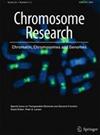在细胞周期中染色体沿中心体和顶基轴运动的同侧限制。
IF 2.8
4区 生物学
Q3 BIOCHEMISTRY & MOLECULAR BIOLOGY
引用次数: 0
摘要
在细胞周期中,同源染色体之间的距离是如何被控制的,我们所知甚少。在这里,我们显示着丝粒成分的分布显示两个离散的簇,从前期到G1间期放置在中心体和顶/基轴的两侧。着丝粒和着丝体跟踪的四维活细胞成像分析表明,着丝粒在一个簇内振荡很大,但不会交叉到另一个簇。我们提出了一个在有丝分裂过程中染色体振荡的轴依赖性同侧限制模型。本文章由计算机程序翻译,如有差异,请以英文原文为准。
Ipsilateral restriction of chromosome movement along a centrosome, and apical-basal axis during the cell cycle.
Little is known about how distance between homologous chromosomes are controlled during the cell cycle. Here, we show that the distribution of centromere components display two discrete clusters placed to either side of the centrosome and apical/basal axis from prophase to G1 interphase. 4-Dimensional live cell imaging analysis of centromere and centrosome tracking reveals that centromeres oscillate largely within one cluster, but do not cross over to the other cluster. We propose a model of an axis-dependent ipsilateral restriction of chromosome oscillations throughout mitosis.
求助全文
通过发布文献求助,成功后即可免费获取论文全文。
去求助
来源期刊

Chromosome Research
生物-生化与分子生物学
CiteScore
4.70
自引率
3.80%
发文量
31
审稿时长
1 months
期刊介绍:
Chromosome Research publishes manuscripts from work based on all organisms and encourages submissions in the following areas including, but not limited, to:
· Chromosomes and their linkage to diseases;
· Chromosome organization within the nucleus;
· Chromatin biology (transcription, non-coding RNA, etc);
· Chromosome structure, function and mechanics;
· Chromosome and DNA repair;
· Epigenetic chromosomal functions (centromeres, telomeres, replication, imprinting,
dosage compensation, sex determination, chromosome remodeling);
· Architectural/epigenomic organization of the genome;
· Functional annotation of the genome;
· Functional and comparative genomics in plants and animals;
· Karyology studies that help resolve difficult taxonomic problems or that provide
clues to fundamental mechanisms of genome and karyotype evolution in plants and animals;
· Mitosis and Meiosis;
· Cancer cytogenomics.
 求助内容:
求助内容: 应助结果提醒方式:
应助结果提醒方式:


